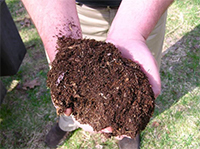BACKYARD COMPOSTING: Creating Healthy Soil with Compost
 Healthy plants grow in healthy soil, growing deeper roots in soil that holds more water and nutrients. So, building your soil with organic materials like compost is one of the best ways to save water, recycle yard and food waste, reduce runoff, and save work in your lawn and garden.
Healthy plants grow in healthy soil, growing deeper roots in soil that holds more water and nutrients. So, building your soil with organic materials like compost is one of the best ways to save water, recycle yard and food waste, reduce runoff, and save work in your lawn and garden.
WHAT IS COMPOST?
Compost is a dark, earthy material naturally produced by decaying plants. Composted organic matter supports a web of soil life, which keeps your soil loose, moisture-holding, fertile and well-drained.
COMPOST BASICS
- Purchase or build your own compost system, or just make a pile. Compost happens!
- Mix one-part greens (grass, leaves and flowers) to one-part browns (dry leaves, sticks and twigs). (50% greens and 50% browns)
- Some kitchen scraps are acceptable (vegetable and fruit peels, eggshells, coffee grounds, etc.). Do not use meat or dairy products - these can attract rodents, flies, and cause bad odors.
- Turn and water regularly; keep your pile moist (like a damp sponge), and move the material around using a pitchfork or shovel.
WHY USE COMPOST?
Compost increases water retention, decreases the need for chemical fertilizers and pesticides, and helps keep a useful resource from going to waste.
LIMITED SPACE? Check out vermicomposting!
Vermicompost is the product of the composting process of using worms, usually red wigglers to create a heterogeneous mixture of decomposing vegetable or food waste, bedding materials, and worm castings. These castings have been shown to contain reduced levels of contaminants and a higher saturation of nutrients than do organic materials before vermicomposting.
COMPOST RESOURCES
Click the links below to learn how to make your own compost at home from yard and food waste.
|
|

